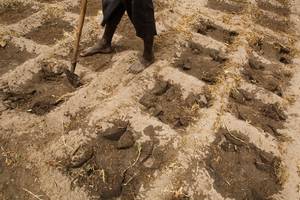Welcome to FAO’s 70th Anniversary portal!
Do you know what FAO has done over the past 70 years to end hunger in the world? Test your knowledge with this short quiz!
Do you want to know more about the story of FAO? We prepared some materials that will take you on a journey through the main events, our leading figures and their endeavors over the past 70 years.
Click here to know more

2005 - 15
Despite natural emergencies and man-made disasters occurring in this period, development goals were set against a tight timeframe and this made a paradigm shift in food security and agricultural development possible. Finally, some measurable progress was being made in radically reducing the number of chronically undernourished people around the world.
Responding to Floods, Famine and Disease
The year 2011 saw two major natural emergencies in Asia and in Africa; flood and famine. Pakistan was hit with the worst floods ever that wiped out seed stores and killed millions of livestock. FAO responded by distributing wheat seed to half a million farming families in time for the planting season. An additional 235 000 families received feed, medicine and shelter for their animals.
In Africa, Somalia had two of its regions suffering from famine due to the worst drought in 30 years, killing over 260 000 people and putting millions more at serious risk. FAO and the international community responded with US$120 million to the drought across the Horn of Africa.
The experience of the bird flu epidemic and other animal health or food safety emergencies set FAO to work on providing assistance in real-time around the planet. In 2006, the Organization unveiled its high-tech Crisis Management Centre to monitor disease outbreaks and dispatched experts to any hot spot in the world in under 48 hours.
Voluntary Guidelines on the Responsible Governance of Tenure of Land, Fisheries and Forests
Beside addressing emergencies, during its 7th decade of existence, FAO has continued to promote and ensure sustainability to agricultural development in a world whose natural resources were being depleted and becoming progressively scarce.
Supporting sustainable development while protecting the environment, were in fact the major goals that were set behind the landmark endorsement by the Committee on World Food Security in 2012 of the FAO’s new Voluntary Guidelines on the Responsible Governance of Tenure of Land, Fisheries and Forests. The guidelines called for the commitment of both the public and private sectors, and included recommendations to safeguard local people’s rights in the event of large-scale land acquisitions, and warding off the phenomenon of land grabs.
FAO launched a major fundraising and advocacy campaign to secure US$ 20 million to implement the guidelines which aimed at helping governments safeguard the rights of people to own or access land, forests and fisheries. Two giant beverage companies, PepsiCo and Coca-Cola joined the campaign. In addition to fair and legal negotiations on land transfers and acquisitions in developing countries, the companies vowed to increase their participation in the Committee on World Food Security and pledged to carry out social and environmental assessments across their global supply chains. For PepsiCo, work began in Brazil, its top sugar-sourcing country while Coca-cola worked alongside Oxfam in various top producing sugar-sourcing countries. In 2014, the Committee on World Food Security (CFS) approved the Principles for Responsible Investment in Agriculture and Food Systems which were founded on the guidelines.
Protecting the Earth
It was during the last decade that FAO renewed its commitment to improve the health of the world’s limited soil resources and stop land degradation. In fact, 33 percent of the world’s soil is moderately to highly degraded due to erosion, nutrient depletion, acidification, salinization, compaction and chemical pollution.
Recognizing that urgent action was required to improve the situation, The Global Soil Partnership endorsed a series of action plans to safeguard soil resources, which provide the basis for global agricultural production in 2014. To raise public awareness, the UN has recognized 5 December as World Soil Day, and 2015 as the International Year of Soils.
Enlarging the Circle of Partnerships
In this decade FAO also has strengthened its network of partners to improve food security and resilience of vulnerable communities around the globe. This is why, in the year 2013, FAO signed a new partnership agreement with the International Federation of Red Cross and Red Crescent Societies (IFRC), the world's largest humanitarian network. According to the agreement signed by the two organizations, FAO would provide technical guidance to complement IFRC's extensive network of 13 million volunteers - who in turn reached some 150 million people - to assist poor households cope with threats and disasters that impact agriculture, food security and nutrition.
To help get the global nutrition agenda back on track, FAO partnered with WHO in 2014 to convene the first major global event on such issues in 20 years. The 2nd International Conference on Nutrition, took place in Rome in late November. At ICN2, Pope Francis urged world leaders to do more, and the event culminated with the adaptation by universal acclaim of a sweeping political commitment to do just that — "The Rome Declaration on Nutrition"— as well as a supporting framework for concrete action by 172 governments.
FAO Awards Extraordinary Achievements
Since setting out a series of time-bound targets, with a deadline of 2015, that have become known as the Millennium Development Goals, progress has made at last in reducing the chronically undernourished in the world’s poorest regions.
In 2013, 38 countries had already been recognized for reducing by half the proportion of people who suffer from hunger. Eighteen of these countries (Armenia, Azerbaijan, Cuba, Djibouti, Georgia, Ghana, Guyana, Kuwait, Kyrgyzstan, Nicaragua, Peru, Saint Vincent and the Grenadines, Samoa, Sao Tome and Principe, Thailand, Turkmenistan, Venezuela and Viet Nam) were awarded for reaching both this goal and the more stringent goal set by the 1996 World Food Summit which was to reduce by half the absolute number of undernourished people.
A year later, FAO honored the achievements of 13 countries in 2014 for their outstanding progress in fighting hunger, an achievement which included reaching international targets ahead of the end-of-2015 deadline. Brazil, Cameroon, Ethiopia, Gabon, the Gambia, Iran, Kiribati, Malaysia, Mauritania, Mauritius, Mexico, the Philippines and Uruguay were the latest in a growing list of countries to make great strides in combating undernourishment.
On 7 June, 2015, FAO awarded another 14 countries (Angola, Bolivia, China, Costa Rica, Dominican Republic, Gabon, Laos, Mali, Mozambique, Myanmar, Nepal, Solomon Islands, Suriname and Uzbekistan) for achieving the MDG1 target 3 of halving the proportion of people who suffer from hunger by 2015.
Today, out of the 129 countries monitored by FAO, 73 have achieved the Millennium Development Goal target.
"If we all do our part, together we can achieve zero hunger during our lifetimes"
José Graziano da Silva FAO Director-General
Seventy-years on from its foundation, FAO has a lot to celebrate. The world has made real progress in fighting global hunger and poverty in recent decades.
However much still needs to be done. Globally, some 800 million people still suffer from chronic hunger while almost one billion remain trapped in extreme poverty.
FAO’s 70th anniversary falls in a year when the international community adopted 17 Sustainable Development Goals which will determine the way countries develop in the decades to come. Two of these goals specify that hunger and poverty have to be eliminated by 2030.Today FAO’s mission and its mandate remain as relevant as ever.
We will embrace these challenges and through our experience and expertise will contribute towards ridding the world of hunger and poverty once and for all.
If we make the effort together we can indeed become the Zero Hunger generation.











